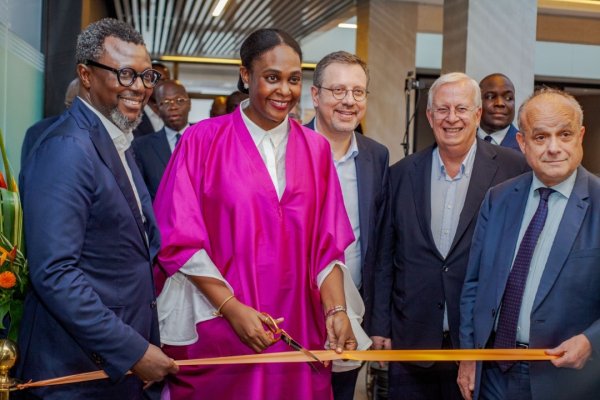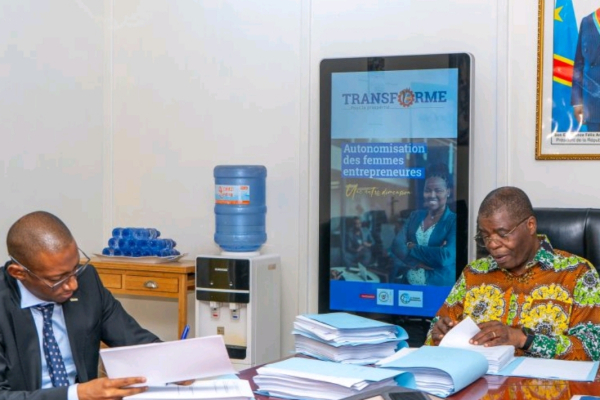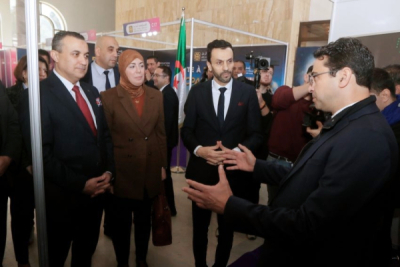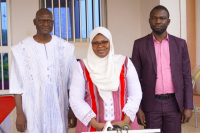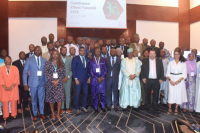Mobile money is emerging as a crucial tool for financial inclusion in Africa, with growing adoption driven by innovative solutions. In this dynamic landscape, Orange Money continues to expand, offering increasingly tailored services to meet user needs.
Orange Money, the mobile money transfer and payment service of French group Orange, officially opened its headquarters in Abidjan on Tuesday, February 18. This move marks a new step in the company's commitment to expanding mobile financial services across Africa and the Middle East.
According to Aminata Kane, CEO of Orange Money Group, establishing the headquarters is a key step in Orange's mission to digitize transactions and support its growing customer base. Jérôme Hénique, Executive Director of Orange Africa and the Middle East (OMEA), emphasized that the initiative reflects the company's drive to strengthen its presence in key markets and continue its 15-year history in mobile financial services.
Since its launch in Ivory Coast in 2008, Orange Money has seen rapid growth, reaching 40 million active monthly users as of February 2025. This growth aligns with a regional trend where mobile financial services play a key role in financial inclusion. In 2023, mobile money transactions in the West African Economic and Monetary Union (UEMOA) reached 171,959.1 billion FCFA (approximately $275 billion), a 146.3% increase from the previous year. Ivory Coast, with over 23 million mobile financial service users in 2023, is a major player in this transformation.
The establishment of Orange Money Group’s headquarters in Abidjan creates new opportunities for the Ivorian market and the region. It will allow for closer engagement with users and more responsive service development. West Africa is becoming a leading hub for mobile money, gradually surpassing East Africa in adoption and growth of digital financial services.
Orange Money continues to innovate, introducing QR code payments for merchants and end users. Through a partnership with Mastercard, the company launched a virtual card in 2024. Available in seven countries, the service is set for further expansion in 2025, reinforcing Orange Money’s role in shaping the future of mobile finance in Africa.
By Samira Njoya,
Editing by Sèna D. B. de Sodji
The Congolese government wants to accelerate financial inclusion by facilitating access to financial services for all segments of the population. To achieve this, it is relying on digital technologies.
The Democratic Republic of Congo (DRC) is moving to digitize its microfinance sector to accelerate financial inclusion. To this end, it awarded on Friday, February 14, a contract to a consortium comprising PAYCODE FINTECH Congo, BANKTECH Software Services, and Hong Kong Top Wise Communications.
Funded by the government and the World Bank, the initiative involves providing 10,000 electronic payment terminals (EPTs) to microfinance institutions (MFIs) and savings and credit cooperatives (COOPECs). This will enable these institutions to connect to the national electronic payment system of the Central Bank of Congo.
The initiative is part of the Transforme Project, which aims to empower women entrepreneurs and upgrade small and medium-sized enterprises (SMEs) for economic transformation and job creation. According to the National Financial Inclusion Strategy 2023-2028, the financial inclusion rate in the DRC stood at 38.5% at the end of 2022. The Congolese government aims to increase this rate to 65% by 2028.
Microfinance institutions and savings and credit cooperatives are expected to play a key role in achieving this goal. By the end of 2022, the DRC had 78 COOPECs and 15 MFIs. These two types of institutions accounted for 86.1% of the country’s credit establishments (108 total) and 32.4% of all financial institutions (287). Additionally, the credit portfolio grew by 21% in 2022, reaching $283.5 million, up from $234.3 million in 2021 and $168 million in 2020. Savings mobilization increased from $256.97 million in 2020 to $333.76 million in 2022, a growth of approximately 30%.
The effective use of the distributed terminals by microfinance institutions and savings and credit cooperatives will be crucial for adoption. The National Financial Inclusion Strategy highlights that their geographic coverage remains uneven. Kinshasa, North Kivu, and South Kivu provinces alone account for nearly 70% of these institutions.
"Despite their higher number compared to banks, microfinance institutions have fewer operational branches (186) than banks (445) and represent only a small share of the financial sector’s assets, around 3%," the strategy document states.
Isaac K. Kassouwi
Edité par Sèna D. B. de Sodji
South African Police Minister Senzo Mchunu has announced the rollout of body-worn cameras for police officers, starting April 2025.
The decision comes in response to a question from the Democratic Alliance, a South African nonprofit, asking when the police service will implement body cameras.
The South African Police Service (SAPS) revealed that it will purchase 100 cameras this year at R28,818 per unit, totaling R2.88 million annually and R14.4 million over five years.
The use of body cameras is crucial for enhancing transparency, accountability, and public trust in policing.
As the digitization of financial services becomes a key driver of economic inclusion, Khallasli is emerging in Tunisia as an innovative solution for facilitating electronic payments. Since 2022, it has been offering a range of services through various channels.
Khallasli is a B2B marketplace for digital financial services developed by a Tunisian startup. It offers a wide range of services, allowing users to pay their bills, purchase mobile top-ups, make payments to microfinance institutions, and reload prepaid bank cards. The Sousse-based startup was founded in 2022 by Khatib Chakchouk.
“Khallasli is a fintech that provides single-account electronic payment solutions by connecting service providers and merchants through an innovative business model that enables secure, efficient, and simple transaction management. Khallasli has become a leading payment facilitator and aggregator in Tunisia,” the startup explains on its platform.
To ensure widespread adoption and ease of use, Khallasli offers multiple access channels. Users can complete transactions through a web interface for point-of-sale (POS) partners, a mobile app called Digitis, interactive kiosks, or an API for businesses looking to integrate the startup’s services into their own digital ecosystem.
Khallasli has secured several partnerships to offer this extensive range of services, collaborating with telecom operators in Tunisia such as Orange, internet service providers, travel agencies, banks, and microfinance institutions.
By Adoni Conrad Quenum,
Editing by Feriol Bewa
AI is transforming various sectors and enhancing productivity. African nations are increasingly recognizing its potential and seeking to invest in this field to harness its economic benefits, foster innovation, and strengthen their position on the international stage.
Algeria aims for artificial intelligence (AI) to contribute 7% of its gross domestic product (GDP) by 2027, Minister of Post and Telecommunications Sid Ali Zerrouki said at the third edition of the CTO Forum Algeria on Monday, February 17. The initiative seeks to diversify the national economy and position the country among global AI leaders.
To achieve this objective, Algeria has invested in top-tier universities specializing in AI, robotics, and mathematics. Additionally, incubators have been deployed nationwide to foster innovation and support the emergence of technology startups.
State-owned telecom operator Algérie Télécom has committed to establishing a 1.5 billion dinar ($11.1 million) investment fund to support startups specializing in AI, cybersecurity, and robotics. This initiative aligns with a presidential strategy to create 20,000 startups as quickly as possible.
In parallel, the government is betting on training programs such as Scale Centers to enhance skills in AI, cybersecurity, and cloud computing, particularly targeting young people without a university education. The National AI Commission has also launched an ambitious strategy to structure and energize this key sector.
Strengthening Digital Infrastructure
To support this growing AI ecosystem, Algeria has made significant investments in digital infrastructure. The government has installed 265,000 kilometers of fiber optic cable and connected 1,400 sites with 4G technology, aiming to improve coverage in remote areas. Additionally, it plans to deploy 7,000 new 4G stations by 2025 to boost connectivity and increase internet speeds.
If successful, this strategy could profoundly transform Algeria’s economy by enhancing productivity in key sectors such as industry, agriculture, and services. AI is expected to play a central role in this transformation by optimizing resource management, automating processes, and facilitating data-driven decision-making.
By fostering the emergence of local startups capable of developing advanced technological solutions, Algeria could not only enhance its economic efficiency but also position itself as an exporter of technology. In this regard, Olumide Balogun, Google’s director for West Africa, highlights that AI could add up to $1.5 trillion to Africa’s GDP by 2030. This projection underscores the importance of Algeria’s full commitment to AI development to capture a significant share of this rapidly expanding market.
By Samira Njoya,
Editing by Sèna D. B. de Sodji
In response to the growing challenges of digital transformation, artificial intelligence, and cybersecurity, many African countries are seeking to strengthen their technological capabilities. In this context, international cooperation is creating new opportunities for development.
Congolese Minister of Posts, Telecommunications, and the Digital Economy, Léon-Juste Ibombo (photo, left), met with Russian Federation Ambassador to the Republic of Congo, Ilias Iskandarov (photo, right), on Monday, February 17, to discuss bilateral cooperation in digitization, artificial intelligence (AI), and cybersecurity.
During the meeting, Ibombo confirmed ongoing negotiations to establish mutually beneficial cooperation with Russian institutions, particularly for the creation of a Russian-African Studies Center, which would include IT training for Congolese citizens.
Iskandarov proposed expanding this cooperation by introducing educational programs dedicated to digital transformation in Congo. These initiatives, planned for administrative and industrial centers, aim to provide advanced training for government officials and private-sector IT specialists on digital regulation, data protection, and AI applications.
This meeting is part of the Congolese government’s efforts to accelerate digital transformation through strategic partnerships. Russia, recognized as an emerging power in technology and cybersecurity, has played a key role in enhancing global digital security.
Since 1998, Russia has been a pioneer in addressing information security at the United Nations, demonstrating early awareness of digital age risks. After years of investment and innovation, Russia has strengthened its expertise, positioning itself among global leaders in the sector. According to the International Telecommunication Union, Russia ranks among the top countries in ICT development, with a score of 90.6 out of 100. In cybersecurity, Russia is classified as Tier 2, a category including advanced nations with scores between 85 and 95.
This partnership is expected to bring significant benefits to Congo, including strengthening local digital skills, improving IT infrastructure security, and facilitating access to advanced technologies. Furthermore, this collaboration could serve as a springboard for new international partnerships in the digital sector, positioning Congo as a key player in the African and global tech ecosystem.
By Samira Njoya,
Editing by Sèna D. B. de Sodji
Recognizing the increasing threat of cybersecurity breaches and digital fraud to African businesses, two tech entrepreneurs have developed a solution to address these critical issues.
Dojah is a digital solution developed by a Nigerian startup to enhance cybersecurity in client onboarding processes. Through its API, the platform secures user integration by leveraging biometric verification (facial recognition and fingerprint scanning), official document analysis (national ID cards, passports, driver's licenses), and authentication via mobile and banking data. The startup was founded in 2021 by Tobi Ololade and Ayomide Oso.
"We help companies offering financial services and digital businesses stay secure, grow seamlessly, and ensure compliance. Our solution streamlines user onboarding, automates AML compliance checks, and proactively prevents fraud and identity theft through end-to-end verification and real-time monitoring," said Tobi Ololade.
Dojah enables businesses to comply with KYC (Know Your Customer) and AML (Anti-Money Laundering) regulations while improving user experience with seamless identification processes. By integrating with multiple official databases and government services, the startup provides fintech companies, banks, marketplaces, and African startups with a fast and reliable solution to secure transactions and prevent identity fraud.
With clients across several African countries and strategic partnerships, Dojah aims to become the leading identity verification provider on the continent. Its flexible, API-based model allows for quick adoption across various sectors, from finance to on-demand services. In 2022, the startup was selected for Y Combinator’s Winter cohort, further accelerating its growth.
By Adoni Conrad Quenum,
Editing by Feriol Bewa
Tingo AI Radio places Africa at the forefront of artificial intelligence innovation, proving that the continent can create and implement cutting-edge AI solutions. By showcasing the practical application of AI in media, it sets the stage for broader AI adoption in industries such as healthcare, agriculture, finance, and governance.
Nigerian businessman and tech entrepreneur Dozy Mmobuosi has launched Tingo AI Radio 102.5 FM in Lagos, Nigeria. The radio station, unveiled on February 14, received full authorization from the Nigerian Broadcasting Corporation (NBC) and operates from a cutting-edge facility on Victoria Island, Lagos.
“Our AI-generated content will be authentically Nigerian, featuring AI agents that understand local languages and accents,” said Dozy Mmobuosi, emphasizing the station’s commitment to responsible AI use and regulatory compliance.
The station merges advanced artificial intelligence with Afro-centric content to deliver a distinctive, immersive audio experience tailored for African listeners.
Tingo AI Radio’s infrastructure eliminates traditional human roles in broadcasting, relying entirely on AI for news direction, sound engineering, and DJing. Listeners can request songs and enjoy curated playlists through a virtual DJ, enhancing interactivity.
The launch event also introduced TingoGPT, an AI model designed for African users, further cementing Tingo’s role in Africa’s technological evolution.
Chief Technology Officer Abraham Samuel highlighted how AI voice cloning streamlines broadcasting, allowing interviews to be pre-recorded with AI-generated voices. AI-driven news, weather forecasts, and interactive features redefine traditional radio operations while cutting operational costs.
“With just a voice sample, we can clone it into our AI system, enabling AI agents to conduct interviews and read scripts, saving time and resources,” Samuel explained.
According to a 2018 McKinsey Global Institute study, the automation trends could boost productivity by up to 2% annually.
However, the launch of Tingo AI Radio 102.5 FM also presents a challenge for the multimedia sector. It raises concerns about the potential impact on jobs within the sector.
Hikmatu Bilali
Thanks to financial support from partners like the World Bank, Burkina Faso is rapidly advancing its digital transformation. In 2024, these efforts have significantly improved government efficiency.
Burkina Faso's Ministry of Digital Transition, Posts, and Electronic Communications unveiled its 2025 digital sector priorities during a 2024 objectives review ceremony on Friday, February 14, chaired by Prime Minister Rimtalba Jean Emmanuel Ouédraogo.
Key 2025 projects include completing data center construction, currently 70% finished, and expanding network coverage to at least 500 underserved localities. The ministry also plans to enhance the digitization of administrative services, conduct large-scale population enrollment for the WURI electronic unique identification project, and launch the Digital Transformation Acceleration Project (PACT DIGITAL), with an estimated budget of $150 million.
In 2024, the ministry launched a project to provide network coverage to over 130 localities in "white zones," rehabilitated the National IT Network for Administration (RÉSINA), began construction on two data centers, and deployed strategic digital platforms to accelerate digital transformation. Other initiatives included developing electronic signatures and legislative reforms to improve the country's digital environment. The ministry reported a 90.4% achievement rate for its 2024 objectives.
These initiatives aim to further Burkina Faso's digital transformation, with the government seeking to position the country as an African leader in integrating ICT into public administration, education, healthcare, commerce, and agriculture. However, Burkina Faso ranks 175th out of 193 countries in the United Nations E-Government Development Index (EGDI), with a score of 0.2895 out of 1, below the West African subregional average (0.3957), the continental average (0.4247), and the global average (0.6382).
The International Telecommunication Union (ITU) assigned Burkina Faso a score of 30.1 out of 100 in its 2024 ICT Development Index, placing it 43rd out of 47 African economies analyzed. According to the ITU, internet penetration in Burkina Faso is 19.9%, and mobile phone penetration is 21%. 3G network coverage reaches 53.2% of the population, while 4G coverage is 36.6%. In cybersecurity, Burkina Faso is classified at Tier 3 out of 5, indicating a need for stronger technical measures and skill development.
The ministry did not specify challenges preventing full achievement of its 2024 objectives, though the 90.4% completion rate was deemed "satisfactory." However, in its mid-year 2024 review, the government acknowledged that efforts to rehabilitate infrastructure and expand digital services in rural areas were hindered by security challenges, exacerbated by political instability.
By Isaac K. Kassouwi,
Editing by Sèna D. B. de Sodji
Cybercrime is rapidly increasing across Africa, with a surge in attacks that exploit security vulnerabilities. Weak infrastructure protection, a lack of public awareness, and outdated software are leaving countries vulnerable to cyber threats, endangering businesses and institutions.
Cyberattacks exploiting security vulnerabilities, or "exploits," nearly doubled in Cameroon over the past year, rising from 174,472 in 2023 to 333,930 in 2024, a 91% increase. These vulnerabilities allow hackers to infiltrate systems through outdated or poorly secured software, threatening critical digital infrastructures. Cybersecurity firm Kaspersky revealed the figures at the KNext forum, held in Douala and Yaoundé on February 12 and 13.
"Faced with a growing cyber threat, Cameroonian businesses and institutions must take a proactive approach to cybersecurity. The commitment of the Ministry of Posts and Telecommunications to KNext Yaoundé 2025 sends a strong signal on the need for collective mobilization against cyberattacks," said Gladys Salmouth, Corporate Communications Manager for Central and West Africa at Kaspersky.
The surge in attacks is largely driven by Cameroon’s ongoing digital transformation. With over 10 million internet users and an estimated internet penetration rate of 45% in 2024, the rapid adoption of online services, cloud computing, and remote work, along with the rise in digital transactions, has significantly expanded the attack surface for cybercriminals.
Beyond exploits, other threats are also gaining ground. Intrusions via the Remote Desktop Protocol (RDP) reached 163,298 cases in 2024, while backdoor attacks accounted for 139,395 incidents. These methods enable cybercriminals to stealthily access systems, steal sensitive data, or deploy ransomware, disrupting businesses and government operations.
The economic consequences of these attacks are substantial. In 2024, cyberattacks cost Cameroon millions of dollars due to data breaches, service disruptions, and ransom payments. Beyond financial losses, companies and institutions also suffer reputational damage and an erosion of trust, key elements for the growth of the country's digital economy.
The threat extends beyond Cameroon. Across Africa, cyberattacks pose a major challenge to local economies. According to the United Nations Economic Commission for Africa, inadequate cybersecurity preparedness costs African nations an average of 10% of their GDP, amounting to nearly $4 billion annually.
To counter these growing threats, Kaspersky urges businesses and institutions to strengthen their cybersecurity posture. Key recommendations include adopting advanced security solutions capable of detecting and blocking threats in real time, securing remote access by restricting unprotected RDP connections, and implementing strict access and data management policies.
Raising employee awareness and providing training on cyber risks, particularly phishing and social engineering attacks, are also essential. Finally, enhanced collaboration between the private sector and government authorities remains a priority. Sharing best practices and reinforcing cooperation among key stakeholders can improve threat detection and response, contributing to a more secure digital environment.
By Samira Njoya,
Editing by Sèna D. B. de Sodji
More...
Blockchain technology is increasingly transforming African economies by providing innovative solutions in finance, energy, and agriculture. Its adoption boosts transparency, streamlines transactions, and accelerates digital transformation.
On Monday, February 17, cryptocurrency company Tether announced it signed a memorandum of understanding with the government of the Republic of Guinea. The strategic collaboration aims to establish a framework for the adoption of blockchain and peer-to-peer technologies to drive economic growth and position Guinea as a key player in Africa’s digital transformation.
"We are thrilled to collaborate with the Republic of Guinea to potentially unlock the immense potential of blockchain and digital technologies across Africa. This MoU reflects our commitment to helping countries build resilient digital economies. Together, we aim to implement efficient blockchain solutions that benefit both public and private sectors, paving the way for economic growth and establishing Guinea as a leader in technological innovation,” said Paolo Ardoino, CEO of Tether.
The agreement focuses on education, innovation, and sustainable technological practices. It includes the introduction of educational programs in both the public and private sectors to raise awareness, enhance skills, and develop local talent in digital technologies. This framework is expected to facilitate blockchain adoption in Guinea and create an environment conducive to innovation.
Tether has undertaken several similar initiatives internationally. The company has been involved in the Lugano Plan in Switzerland, aimed at promoting blockchain adoption, as well as educational projects on digital assets in Turkey and the Middle East.
This initiative is part of the Simandou 2040 project, launched by President Mamadi Doumbouya, which places technology at the core of the country’s development strategy. The agreement follows a recent meeting between the Minister of Posts, Telecommunications, and the Digital Economy, Rose Pola Pricemou, and a Tether delegation. The meeting aimed to establish a favorable framework for implementing the collaboration.
In Guinea, where digital transformation is underway, blockchain adoption could play a crucial role in financial inclusion. This technology offers solutions tailored to local realities, such as facilitating cross-border payments, reducing transaction costs, and securing financial exchanges. With a low banking penetration rate, digital assets and blockchain present a significant opportunity to modernize financial systems and promote more inclusive growth.
Beyond finance, blockchain can also contribute to sustainable development in Africa. In agriculture, it enables tracking product value chains, ensuring compliance with sustainable practices and certification. Farmers can thus prove that their products are organic and fair trade, gaining access to new markets and increasing their incomes.
In the energy sector, blockchain facilitates the management of decentralized power grids and promotes the adoption of renewable energy. Blockchain-based microgrids make it possible to monitor energy production and consumption in real time, improving electricity access in rural areas while reducing dependence on fossil fuels.
By Samira Njoya,
Editing by Sèna D. B. de Sodji
The Federal Ministry of Communication, Innovation, and Digital Economy has launched the National Girls in ICT Competition to increase female participation in technology. The initiative provides secondary school girls with a platform to showcase their skills in coding, web development, cybersecurity, and data analytics while addressing gender gaps in the industry.
Participants will develop hands-on ICT skills and gain recognition from industry leaders. They will also access mentorship, workshops, and networking opportunities.
Interested participants must register online and form a team of three with teacher support. Teams must identify a community problem and develop a tech-based solution. Applications close by March 6, 2025.
NIGCOMSAT invites Nigerian startups to develop innovative solutions using space technology. The program offers mentorship, global exposure, networking, and funding opportunities.
Applicants must be at least 18, have a registered Nigerian startup, possess a Minimum Viable Product, and integrate space-based technology into their solutions.
The application period runs from February 1 to March 17, 2025. The selection process will occur from March 24 to April 25, followed by the cohort presentation from April 28 to May 2. The program will launch on May 5, with an intensive deep-dive phase from May 12 to October 10.
Like many African countries, Tunisia is relying on international cooperation to develop its rapidly growing digital sector. It recently strengthened its ties with India.
Tunisia and France discussed potential digital cooperation, including artificial intelligence, during the AI Action Summit held in Paris from February 10-11, according to the Tunisian Ministry of Communication Technologies.
On the sidelines of the summit, Tunisian Minister of Communication Technologies Sofiene Hemissi met with Clara Chappaz (photo, right), France’s Minister Delegate for Artificial Intelligence and Digital Affairs.
“On this occasion, the minister expressed Tunisia’s ambition to actively contribute to the implementation of the orientations and initiatives discussed at the summit, aiming to harness artificial intelligence technologies for the benefit of humanity in a responsible and inclusive manner,” the Tunisian ministry said in a press release.
The potential partnership could support Tunisia’s broader digital transformation strategy, which the government considers a key driver of socio-economic development.
France ranks 34th globally in the United Nations e-Government Development Index, with a score of 0.8744 out of 1, exceeding the global average of 0.6382. Tunisia’s score is 0.6935.
In cybersecurity, France is recognized by the International Telecommunication Union (ITU) as a global leader. Tunisia is categorized in Tier 3 out of 5, indicating potential for improvement, particularly in organizational measures, capacity building, and international cooperation.
Regarding ICT development, the ITU gives France a score of 89.8 out of 100, while Tunisia scores 77.2, ranking 8th in Africa out of 47 countries.
Discussions between the two countries are in preliminary stages. The specific framework for potential collaboration remains undefined, and no official agreement has been signed or announced. The future of negotiations will determine the specific direction and implications of any partnership.
By Isaac K. Kassouwi,
Editing by Sèna D. B. de Sodji


